11 Things Miserable People Do On Their Phones That Happy People Avoid At All Costs
These phone habits are more detrimental than many of us want to realize.
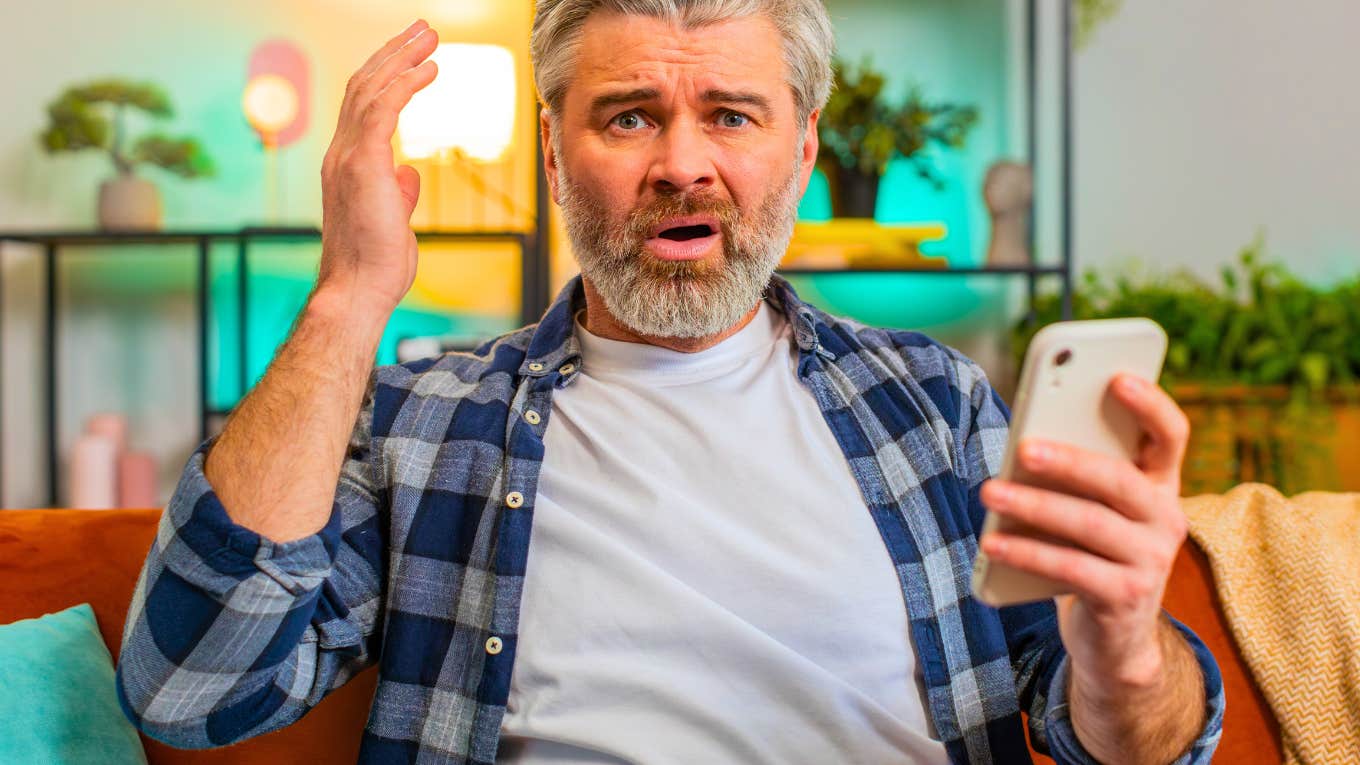 Andrii Iemelianenko / Shutterstock
Andrii Iemelianenko / Shutterstock While there are many consequences to too much screen time and overusing social media, a study published in Frontiers in Psychiatry found that they can often reduce cognitive-emotional regulation. The more time someone spends on their phone, the harder it often is for them to regulate their own emotions and garner cognitive strength to complete even the simplest everyday rituals and tasks.
There are many things miserable people do on their phones that happy people avoid at all costs, many of which exacerbate these screen time issues. From emotional regulation to social isolation and heightened mental health struggles, their cell phones and technology habits often lie at the heart of their everyday struggles.
Here are 11 things miserable people do on their phones that happy people avoid at all costs
1. Doomscroll in bed
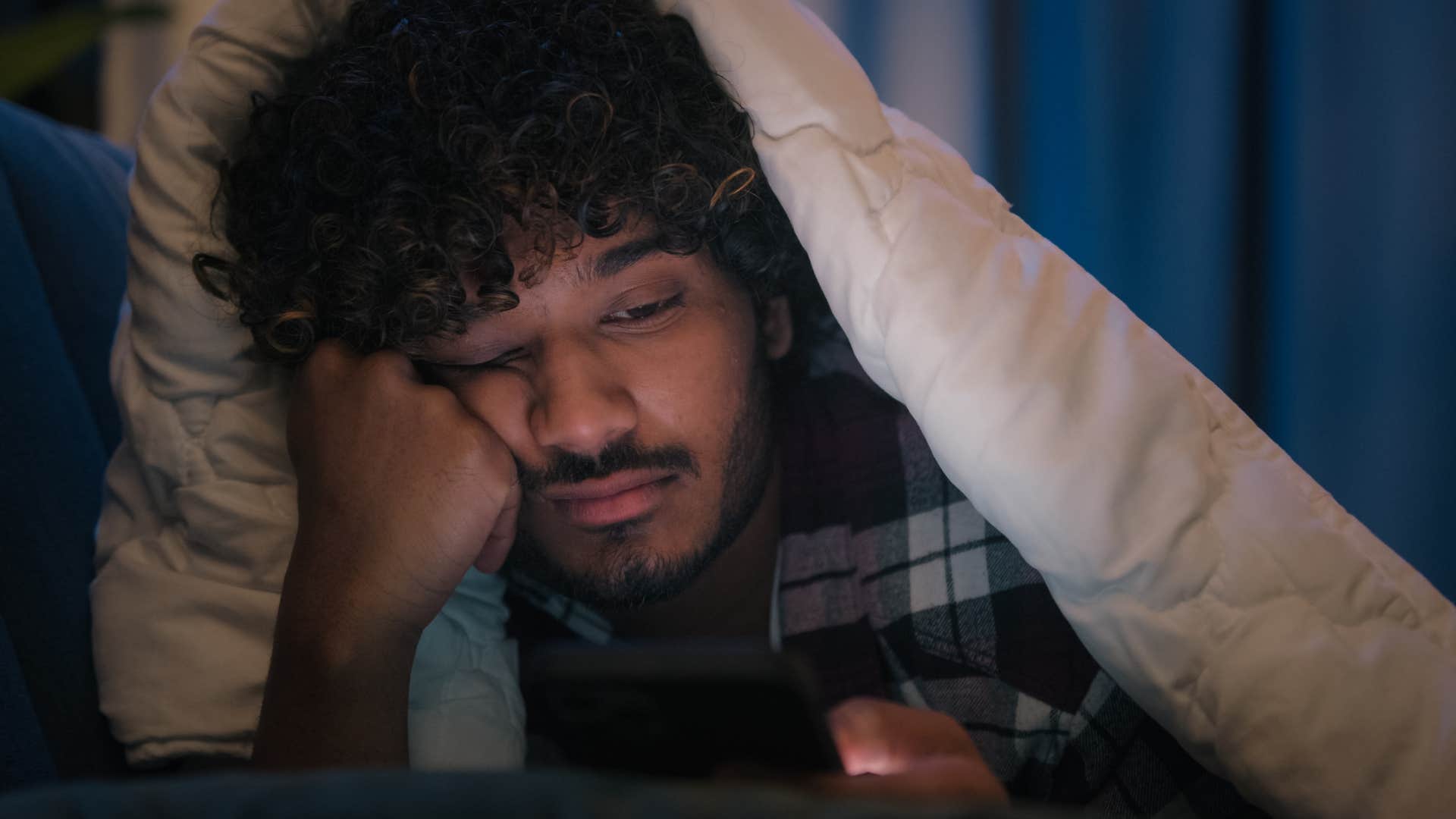 MAYA LAB | Shutterstock.com
MAYA LAB | Shutterstock.com
Whether it’s getting on their phones, answering emails, and scrolling social media the second they wake up in the morning or trying to unwind behind their screen at night, these are some of the things miserable people do on their phones that happy people avoid at all costs.
According to a study published in Frontiers in Psychiatry, people who scroll in bed often have worse sleep quality throughout the night and struggle falling asleep. When you’re overloading your brain with information from social media and your phone, it doesn’t have a chance to regulate, so you’re either starting your day in fight or flight mode or sabotaging your sleep by leaning into mental chaos before bed.
2. Working
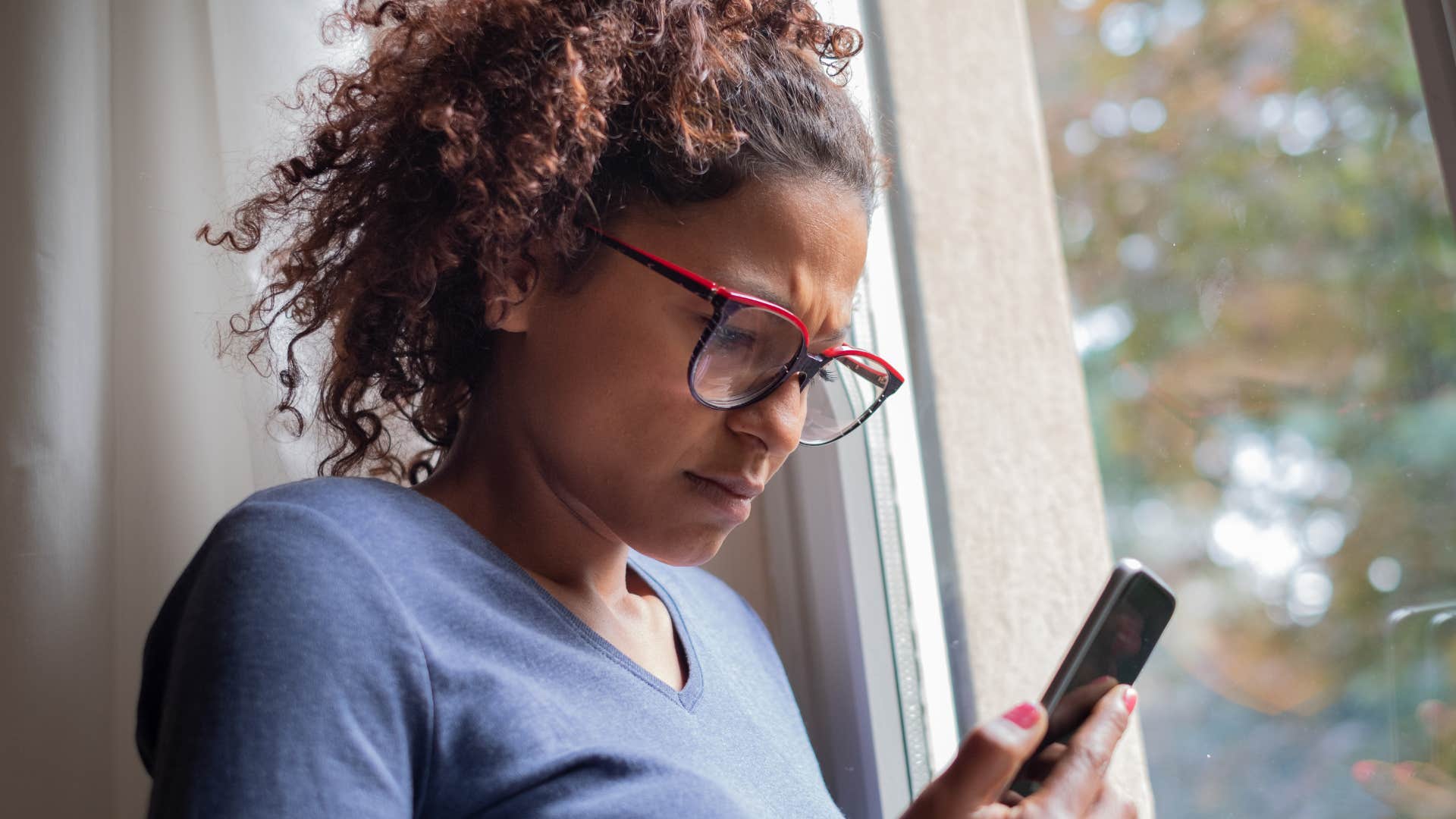 F01 Photo | Shutterstock.com
F01 Photo | Shutterstock.com
Of course, not everyone has the luxury of fully disconnecting from work when they’re at home, but setting boundaries around working on a personal phone is often a necessity for finding some semblance of work-life balance. Whether it’s making the decision to not answer work emails from bed in the morning or having “off” hours for answering work calls at night,
Happy people can still work from their phones and be dedicated professionals with loyalty to a company outside of working hours, but it’s the boundaries they set that protect them from adopting miserable habits in their personal lives.
3. Stalking people they’re jealous of
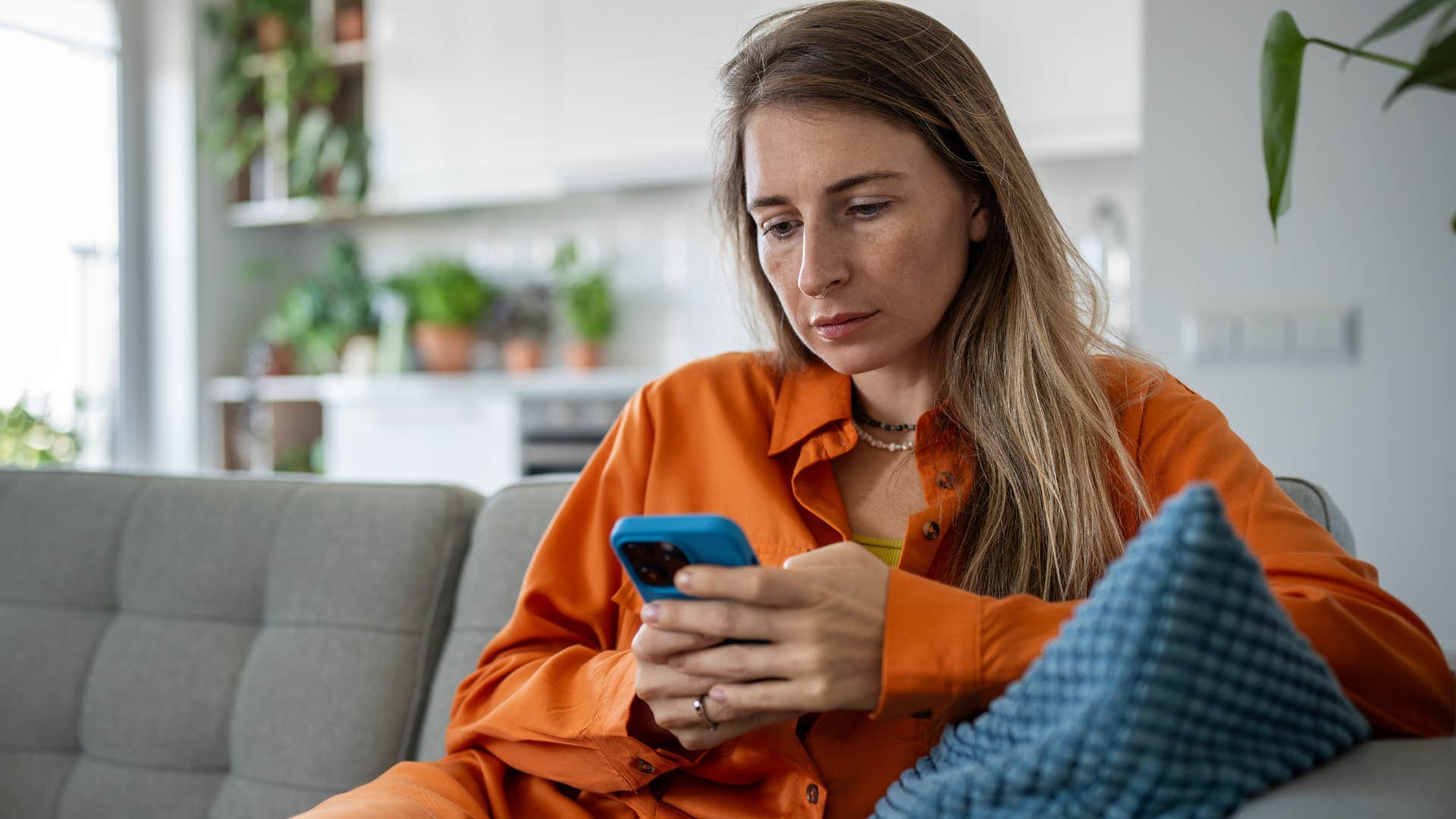 DimaBerlin | Shutterstock.com
DimaBerlin | Shutterstock.com
Feeling envy and jealousy while scrolling online is natural – something that truly happens to all of us at one point or another. But we don’t have to condemn these feelings with guilt and shame. We can simply acknowledge them as desires. When we feel jealousy, it’s a reminder of what we want and where we still have room to grow.
However, if that mindset shift doesn’t come naturally, miserable people can get stuck in ruminating over comparisons and harboring jealousy toward people they truly admire online. That’s why boundaries are so important, whether it’s blocking people they find themselves constantly stalking or being intentional with how they follow, these small things can make a big difference in mood on an everyday basis.
4. Arguing with strangers
 Ekateryna Zubal | Shutterstock.com
Ekateryna Zubal | Shutterstock.com
Our social media algorithms and feeds often promote negativity and boost the most controversial, emotionally charged content, which is why so many of us find ourselves in a spiral of media overload that negatively affects our mood and mental health.
When we’re only seeing controversial posts that make us feel personally attacked or victimized, we’re more likely to argue in the comments and get frustrated over things that we wouldn’t see if it weren’t for social media scrolling.
That’s why this is one of the things miserable people do on their phones that happy people avoid at all costs. The healthiest, happiest people set limits to their doomscrolling, carefully curate their feeds, and set boundaries that protect their well-being from harm.
5. Multitasking at home
 GaudiLab | Shutterstock.com
GaudiLab | Shutterstock.com
According to a Stanford Report, chronic multitaskers often have reduced cognitive skills, abilities, and memory, which is why doing multiple things on their phones and distracting themselves from internal feelings with a screen are things miserable people often do. They’re overloading their brains with information from their phones, while simultaneously dealing with internal emotional overwhelm or responsibilities.
Even if it’s simply needing a screen to entertain them while they’re eating or relying on their phones to unwind at night, these are only acting as distractions for the kind of attention and intention we need to thrive in each of our small rituals throughout the day.
6. Constantly looking to see who’s liked or seen their content
 Krakenimages.com | Shutterstock.com
Krakenimages.com | Shutterstock.com
If someone’s posting a selfie on their Instagram story, only to go back onto the platform a million times to see who’s liked or viewed it, chances are they’re falling into a spiral of seeking external validation from others.
They’re not posting for the sake of creativity, authenticity, or staying connected with loved ones, but instead phishing for a compliment or hoping to feel accepted by other people by posting things they believe they’d find attractive or interesting.
7. Constant comparisons to other people
 Fizkes | Shutterstock.com
Fizkes | Shutterstock.com
According to a 2022 study, social media often exacerbates the relationship between depressive symptoms and social comparisons. Not only do insecure, miserable people have more access to comparing themselves online and on social media, but they’re often more likely to adopt depressive symptoms to cope with the harm they cause.
They’re stuck in a cycle of seeking validation on social media, comparing themselves to unrealistic portrayals of other people’s lives, and coping with isolating behaviors that generally condemn their lives to a chronically unhappy place.
8. Spending more time filming than living life
 Krakenimages.com | Shutterstock.com
Krakenimages.com | Shutterstock.com
If someone’s always living for the sake of a good Instagram picture or filming every single event in their lives, chances are they’re living less in the present moment than they realize. Everything they say and do is in the context of attention and validation online, sabotaging their memories, isolating themselves from genuine friends, and ensuring their phone is always serving as a distraction in their lives.
This is one of the things miserable people do on their phones that happy people avoid at all costs. A happy person may take a photo for the memories or even vlog certain things on an online platform. But when they’re connecting with people, spending quality time with loved ones, and doing things to fill their cup, they’re not worried about capturing it all for social media.
9. Staying in toxic group chats
 Voronaman | Shutterstock.com
Voronaman | Shutterstock.com
Staying in toxic group chats is just one of the things miserable people do on their phones that happy people avoid at all costs. Of course, overusing social media has negative effects on relationships and mental health, but for the most part, it’s the people and content we’re interacting with that truly make a difference in how we feel.
For example, if we’re in a toxic group chat with friends who are always popping up on phones, it can quickly sabotage our mood or anything positive happening in our lives.
10. Using it as a distraction
 garetsworkshop | Shutterstock.com
garetsworkshop | Shutterstock.com
Whether it’s feeling chronic stress during the day and resorting to mindless entertainment at night or actively avoiding conflict with a partner at home by doomscrolling on their phones, these are some of the things miserable people do on their phones that happy people avoid at all costs.
According to a study published in Scientific Reports, even the mere presence of a phone can be distracting at home with loved ones and while trying to be productive in the office, so it’s important to have boundaries. If you find yourself using your phone and doomscrolling as an escape, you’re not only isolating yourself from others, you’re sabotaging your ability to regulate emotions.
11. Overusing filters
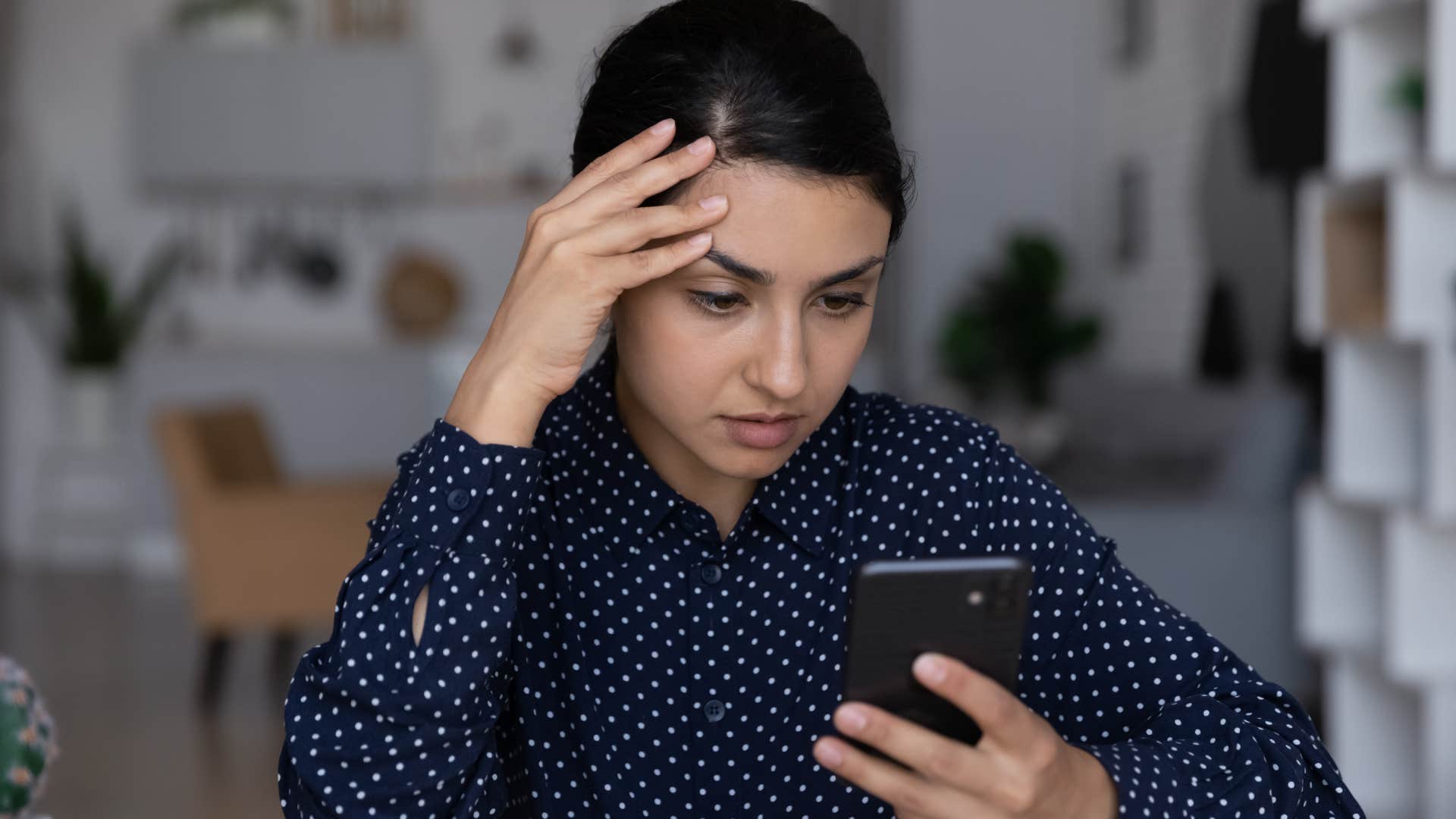 Fizkes | Shutterstock.com
Fizkes | Shutterstock.com
According to psychology professor Tara Well, overusing filters on social media and online often has many negative effects on mental health. Not only does it often lower self-esteem and encourage people to disconnect from their true self-image and concept, but it also isolates them from other people who may unfairly compare themselves to the unrealistic image of you online.
This behavior is most common amongst miserable people because they’re trying to seek validation from others by holding themselves to unrealistic standards, yet only end up more isolated, resentful, and lonely in the end.
Zayda Slabbekoorn is a senior editorial strategist with a bachelor’s degree in social relations & policy and gender studies who focuses on psychology, relationships, self-help, and human interest stories.

